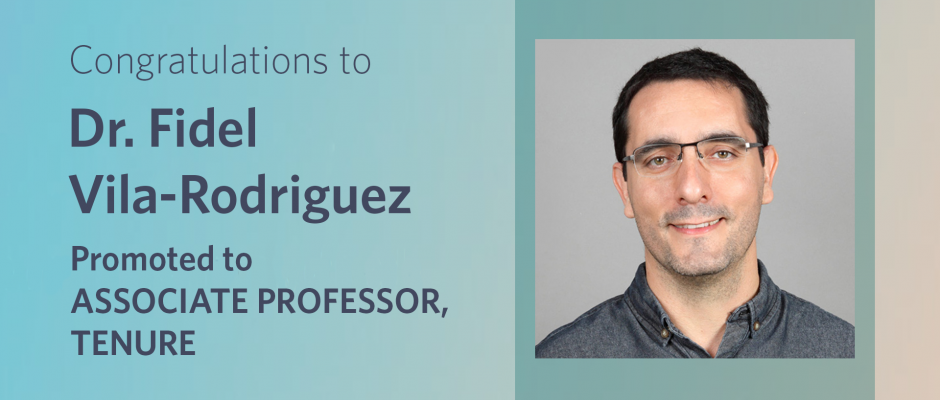
Congratulations to Dr. Fidel Vila-Rodriguez, who has been promoted to the rank of Associate Professor with Tenure!
Dr. Vila-Rodriguez has been a member of Department since 2012, having first been appointed as a Clinical Assistant Professor in 2012. In 2015, he was promoted to the rank of Clinical Associate Professor, then was recruited as a full-time academic faculty member in 2016. He holds an MD from the Universitat Autonoma de Barcelona in 2000, a Master’s degree in Neuroscience from the Universitat de Barcelona in 2007, and completed his PhD in the UBC Neuroscience program in 2018.
Dr. Vila-Rodriguez’s research focus lies in novel therapeutic applications within non-invasive neurostimulation therapies (NINETs) to treat and assess psychiatric disorders, including the most severe forms of psychosis and depression. The NINET laboratory, which he established in 2014, is the only centre in Canada to host both simultaneous Transcranial Magnetic Stimulation-Functional Magnetic Resonance Imaging (TMS-fMRI) and Transcranial Direct Current Stimulation-Functional Magnetic Resonance Imaging (tDCS-fMRI) capability, and currently, Dr. Vila-Rodriguez is setting up the first repetitive TMS (rTMS) Clinic Program within the community, in partnership with Mood Disorders Association of BC.
Of note, his recent study, published in the American Journal of Psychiatry, combined rTMS with fMRI in order to map for the first time changes occurring in the brain during rTMS treatment in patients with depression. This work has since received a great deal of interest from the wider neuroscience community as well as national and international media, given its novel insights into brain activity while receiving rTMS treatment, which are laying important groundwork for future non-invasive treatment pathways for depression and neuropsychiatric disorders.
Dr. Vila-Rodriguez is also involved in international efforts to improve the translatability of clinical brain stimulation paradigms, which include comparing repeated and theta-burst TMS protocols, which are revealing how intermittent theta-burst protocols may be as clinically effective and more cost-effective than repeated TMS for treatment of depression. Further to his pursuits in this area, Dr. Vila-Rodriguez has been establishing several multicenter studies on clinical research in depression. As well, he has been both leading and contributing to studies across other clinical and foundational science domains that employ the latest state-of-the-art methods, such as approaches in machine learning, and involve extensive collaboration with researchers in computer science, biomedical engineering and other disciplines at UBC and beyond.
Please join us in warmly congratulating Dr. Vila-Rodriguez on his well-deserved promotion!